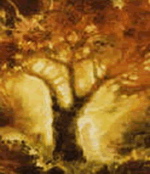Reading on: The animistic world-view
Mystica web site (www.themystica.org/mystica/articles/a/animism.htm)
by Alan G. Hefner and Virgilio Guimaraes
The term animism is derived from the Latin word anima meaning breath or soul. The belief of animism is probably one of man's oldest beliefs, with its origin most likely dating to the Paleolithic age. From its earliest beginnings it was a belief that a soul or spirit existed in every object, even if it was inanimate.In a future state this soul or spirit would exist as part of an immaterial soul. The spirit, therefore, was thought to be universal.
There has been sharp divisions of thought as to the original concept of animism held by primitive peoples. A British anthropologist Sir Edward Burnett Tylor in his "Primitive Culture" (1871) defined animism "as a general belief in spiritual beings and considered it 'a minimum definition of religion.'" He stated all religions from the simplest to the most complexed shared some sort of animistic belief. According to him primitive peoples, defined as those without a written tradition, believed the spirits or souls caused life in human beings. They pictured these souls as vapors or shadows going from one body to another. The souls not only passed between human beings but into, plants, animals and inanimate objects as well.
Tylor reasoned primitive man arrived at his animistic belief to help him explain the causes of sleep, dreams, and death. There naturally aroused a need to distinguish between an individual who was awake and one who was asleep, or an individual who lived and one who did not. Also there was a need to give a reason for the pictures some saw when they slept. The spirits were the early man's explanations.
Other anthropologists were not convinced that primitive man had developed the intellect to form even such simplistic explanations as Tylor proposed. They suggested that early religion was more emotional and intuitional in origin. Early humans recognized that some inanimate objects behaved in some unusual way which mysteriously made them seem alive. They treated such objects as having a life and will of their own, but they never distinguished the soul as separate from the body, and could enter or leave the body...
It is insignificant how men and women gained the belief that a spirit or soul resides in all objects it is historically evident that they did.


